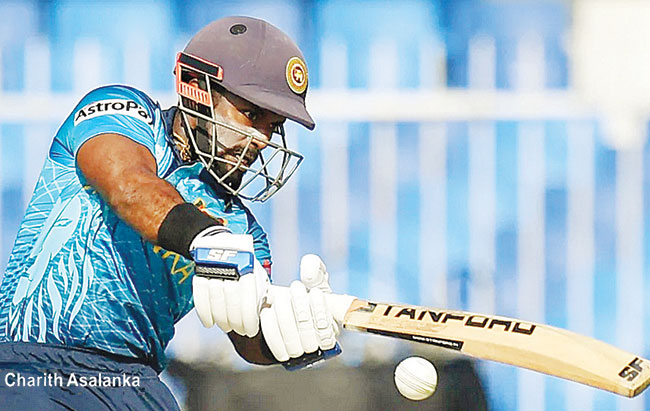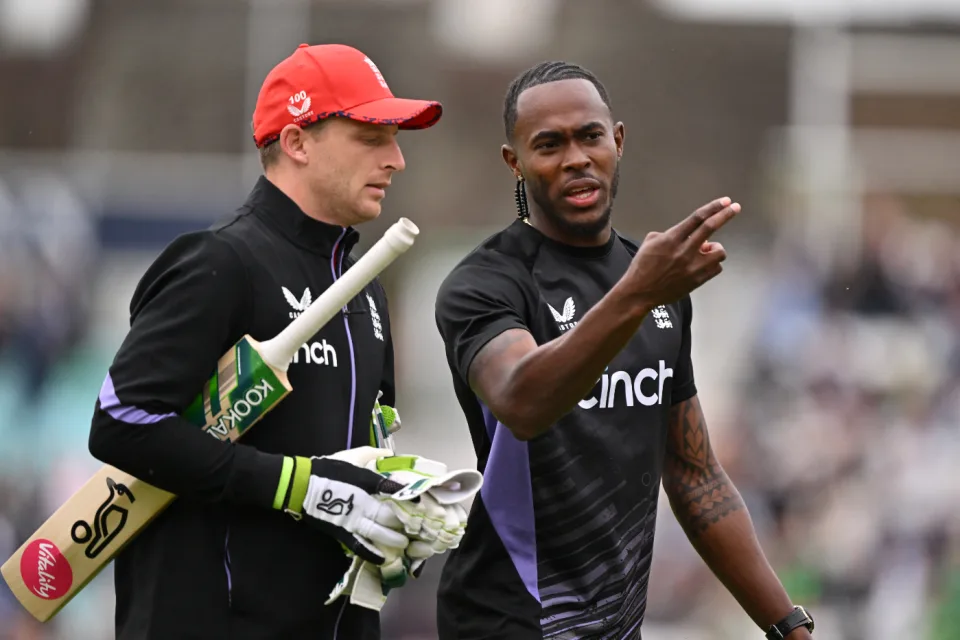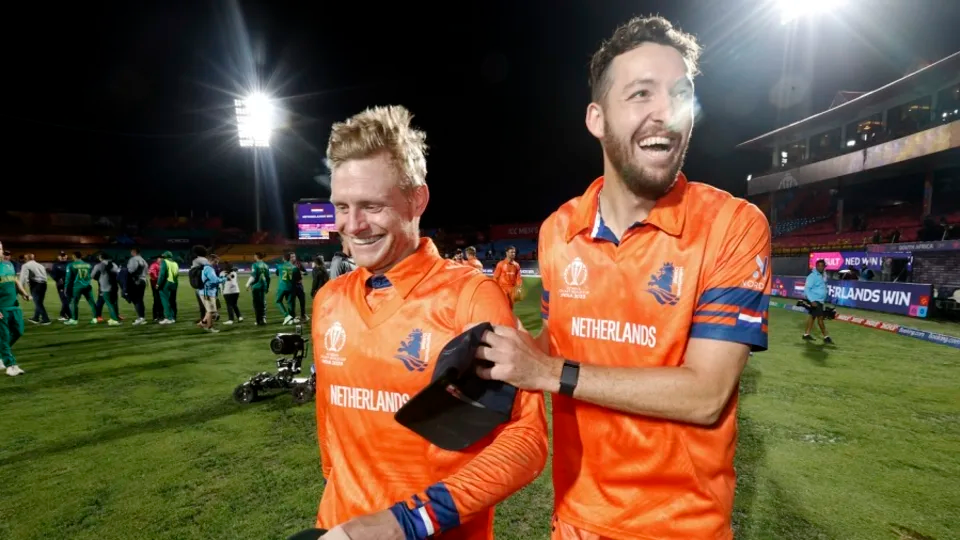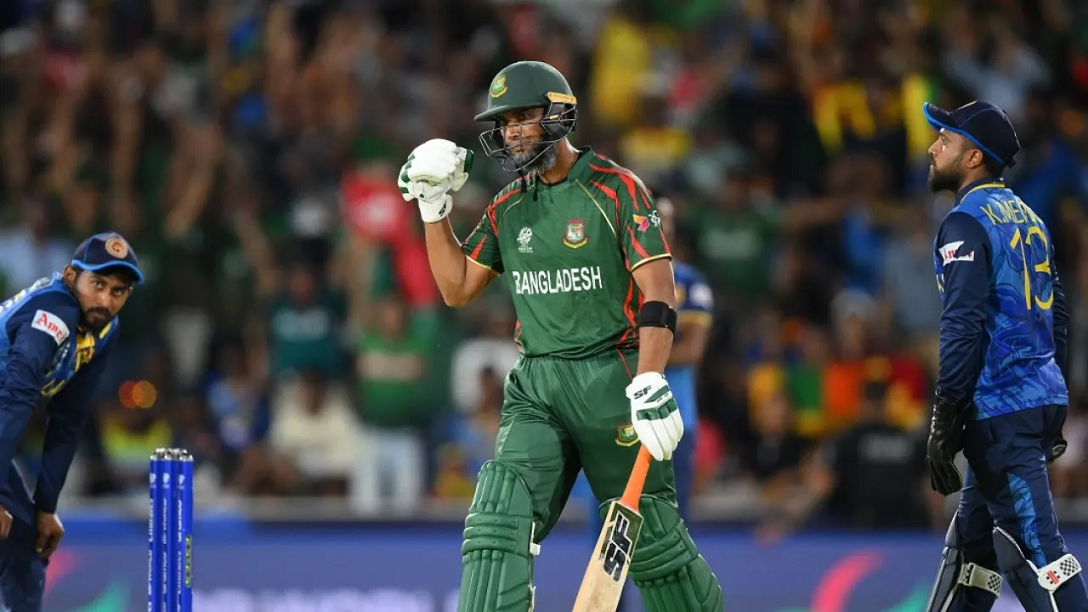Sports
Hasaranga and Asalanka named in ICC Men’s T20 World Cup team

ICC T20 World Cup Tournament’s highest wicket taker Wanindu Hasaranga and Charith Asalanka have been named in the official ICC Men’s T20 World Cup Most Valuable Team of the Tournament.
While Babar Azam has been named captain of the team, players from six countries have been named in the team.
Stars from champions Australia, runners-up New Zealand, semi-finalists England and Pakistan as well as Sri Lanka and South Africa feature in the star-studded line up.
Opening batter David Warner, leg-spinner Adam Zampa and seamer Josh Hazlewood all make the cut for Australia after helping steer their side to their first ever ICC Men’s T20 World Cup title.
There are also spots for England ace Jos Buttler as wicketkeeper, Pakistan’s Babar Azam as captain, New Zealand left-armer Trent Boult and Sri Lanka star Wanindu Hasaranga – the tournament’s leading wicket-taker – in the line-up.
The side was pulled together by a selection panel featuring commentators, former international players and journalists Ian Bishop (Convenor), Natalie Germanos, Shane Watson, Lawrence Booth – of Wisden, the Daily Mail and Mail on Sunday – and Shahid Hashmi of Agence France Presse and ARY Channel.
Ian Bishop said: “As with any team selection there will be varying opinions, and robust discussion on the final composition of the squad. The panel respects that, and we encourage the strong debate that will ensue. This team was incredibly difficult to select over such a highly competitive tournament. Selections were based predominantly on the Super 12 onward to the final.”
The team of the ICC Men’s T20 World Cup 2021 (in batting order) is:
David Warner (Australia) – 289 runs at 48.16
Jos Buttler (wk) (England) – 269 runs at 89.66, five dismissals
Babar Azam (Captain, Pakistan) – 303 runs at 60.60
Charith Asalanka (Sri Lanka) – 231 runs at 46.20
Aiden Markram (South Africa) – 162 runs at 54.00
Moeen Ali (England) – 92 runs at strike rate of 131.42, seven wickets at 11
Wanindu Hasaranga (Sri Lanka) – 16 wickets at 9.75
Adam Zampa (Australia) – 13 wickets at 12.07
Josh Hazlewood (Australia) – 11 wickets at 15.90
Trent Boult (New Zealand) – 13 wickets at 13.30
Anrich Nortje (South Africa) – nine wickets at 11.55
12th: Shaheen Afridi – seven wickets at 24.14
Warner came into the tournament in uncharacteristically patchy form but laid those demons to rest in style with a power-packed set of performances.
The left-handed Australian opener racked up a tally of 289 runs – the second most of the tournament – at a healthy average of 48.16 to help propel his team to victory in Sunday’s Dubai final.
Warner struck 65 against Sri Lanka in the Super 12 stages, before a breath-taking 89 not out against the West Indies and then 49 against Pakistan in the semi-finals placed his team on the cusp of global glory.
And his 53 in the final provided the perfect support act for Mitchell Marsh – 77 not out – as Australia chased down a total of 173 to clinch their maiden ICC Men’s T20 World Cup crown.
England star Buttler was in similarly blistering form throughout, scoring just 20 runs fewer than Warner at a brilliant average of almost 90.
He cracked a perfectly-paced century against Sri Lanka – off just 67 balls – when his team needed him most, while his brutal knock of 71 not out against Australia helped fire England to an emphatic eight-wicket victory against the eventual champions.
 Captaining the side at No.3 is Pakistan skipper Babar, who was the only batter to break the 300-run barrier throughout the duration of the competition.
Captaining the side at No.3 is Pakistan skipper Babar, who was the only batter to break the 300-run barrier throughout the duration of the competition.
His 68 not out against old rivals India powered Pakistan to a memorable 10-wicket victory, while three further half-centuries in the Super 12 stages helped book his team’s slot in the semi-final against Australia.
And while they were unable to battle past Aaron Finch’s outfit, Babar helped himself to 39 in the first innings to finish his campaign in typically consistent fashion.
Asalanka slots in at No.4 after his match-winning innings against Bangladesh in the Super 12s.
With his team in pursuit of 172 to win, Asalanka cracked a scintillating 80 not out off just 49 balls to guide Sri Lanka over the line and solidify his reputation as one of his country’s brightest talents.
A further innings of 68 against the West Indies soon followed as Asalanka scored 231 runs at an average of 46.20 throughout the course of the tournament.
South African Markram and England all-rounder Moeen occupy the No.5 and 6 positions, with Markram’s quickfire 52 not out against England helping down Eoin Morgan’s team in Sharjah.
Another half-century against the West Indies helped him reach a total of 162 runs at an average of 54 while for Ali, a haul of 92 – at a strike rate of 131.42 – provided a valuable contribution for England.
His economical off-spin also went for just 5.50 per over as his seven wickets at 11 saw him function as a crucial string to England’s T20I bow.
Completing the middle order is Hasaranga, who stands tall as the tournament’s leading wicket-taker with a stunning 16 from his eight matches.
The skilful leg-spinner bagged a brilliant hat-trick against South Africa as he dismissed Temba Bavuma, Markram and Dwaine Pretorius – across two separate spells – to etch his name into ICC Men’s T20 World Cup folklore.
And a further three wickets against England, bolstered by two against Australia, saw him emerge as the most prolific bowler of the tournament and firmly deserving of his place in the Team of the Tournament.
Australian pairing Zampa and Hazlewood line up at No.8 and 9, with fellow leg-spinner Zampa lying closely behind Hasaranga in the tournament’s leading wicket-takers.
Conceding an average of his 5.81 runs an over, the Australian ace removed 13 victims across his seven matches – including a memorable five-wicket haul against Bangladesh in the Super 12s.
Zampa ended with figures of 5 for 19 off his four overs and after Australia navigated their way to the final, teammate Hazlewood followed in his footsteps with a record-equalling three for 16 against the Black Caps.
Hazlewood dismissed Kane Williamson, Daryl Mitchell and Glenn Phillips in Dubai and his figures represented the joint-best of any seamer in an ICC Men’s T20 World Cup Final alongside Indian Irfan Pathan in the 2007 showpiece.
And that helped cap a haul of 11 total wickets as the skilful right-armer proved a crucial weapon in guiding Justin Langer’s team to their maiden tournament title.
 Rounding off the side at No.10 and 11 are fellow pace bowlers Trent Boult and Anrich Nortje, who both took 13 and nine wickets respectively for New Zealand and South Africa.
Rounding off the side at No.10 and 11 are fellow pace bowlers Trent Boult and Anrich Nortje, who both took 13 and nine wickets respectively for New Zealand and South Africa.
Left-armer Boult took three-fers against both India and Afghanistan, while grabbing both of his team’s wickets in the final helped him finish the tournament with an average of 13.30.
Nortje’s express pace sees him slot into the team at No.11, with his nine wickets at 11.55 featuring a barnstorming performance that blew away Bangladesh.
He took three for eight off his 3.2 overs to help bowl the Tigers out for just 84 and further enhance his reputation as one of the short format’s most blockbuster bowlers.
Taking his place as 12th man is Pakistan prodigy Shaheen Afridi, who started his tournament in style with a blistering new ball spell against old foes India.
Afridi, 21, removed the talismanic top three trio of Rohit Sharma, KL Rahul and captain Virat Kohli to end with figures of three for 31 and lay the foundations for a memorable victory.
The left-arm pacer finished the tournament with seven wickets at 24.14 and will no doubt continue to star at multiple more ICC World Cup events throughout an exciting future career.
Sports
England face Australia in the battle of champions

The first truly heavyweight clash of this expanded T20 World Cup format comes freighted with both history and subplots. A rematch of the 2010 World T20 final at Kensington Oval, the match pits Jos Buttler’s defending champions – who are aiming to become the first team to retain the trophy – against the Australian winning machine, victors at the 2021 edition and current world title-holders in Test and ODI cricket. And that’s before you throw in the Ashes for afters.
Already there is added pressure on England, after the rain in Bridgetown led to a share of the points in their opener against Scotland (and that having conceded 90 runs from 10 overs without taking a wicket in a tepid bowling display). Lose to their oldest rivals and it will leave their Super 8 prospects open to being waylaid by the perils of net run-rate calculations, or worse.
The Scotland match was the third abandonment in five suffered by England, after a rain-affected home series against Pakistan, which has clearly hampered their readiness for this campaign after almost six months without playing T20 together. It does not take much for a side to click in this format – and England looked in decent shape when they did get on the field against Pakistan – but Buttler will be anxious for things to go their way on Saturday, if only to avoid further questions referencing the team’s disastrous ODI World Cup defence last year.
Australia, under the laidback leadership of Mitchell Marsh would love nothing more than to add to the English sense of jeopardy – having helped bundle them out of the tournament in India on the way to taking the crown. Their head to head record is less impressive in T20 however, with England having won six of the last seven completed encounters, as well as that 2010 final.
Despite a wobble with the bat, Australia avoided mishap against Oman earlier in the week, the experience of David Warner and Marcus Stoinis shining through in difficult batting conditions. Surfaces in the Caribbean – not to mention those games staged in the USA – have already had teams scratching their heads; rather than the “slug-fest” England had prepared for, following a high-scoring tour of the Caribbean in December, it looks as if boxing smart may be the way to go.
Speaking of Warner, this could be the last time he faces up against England in national colours – and another match-winning contribution would likely reduce the chances of them meeting again in the knockouts. On the other side of the card is Jofra Archer, fresh from an emotional maiden outing at Kensington Oval and ready to take on Australia for the first time in any format since 2020. Can Mark Wood fire up England’s campaign, as he did during last summer’s Ashes? Will Pat Cummins be back to harass the old enemy once again? Seconds out, it’s almost time to rumble.
Cummins is set to return after being rested for the Oman game, which saw Mitchell Starc leave the field with cramp. Starc is understood to be fine and could keep his place – which would likely see Nathan Ellis miss out. Marsh is still not fit to bowl, with Australia likely to continue with the allrounder combination of Stoinis and Maxwell to give them cover.
Australia (probable XI): David Warner, Travis Head, Mitchell Marsh (capt), Glenn Maxwell, Marcus Stoinis, Josh Inglis (wk), Tim David, Pat Cummins, Nathan Ellis/Mitchell Starc, Adam Zampa, Josh Hazlewood
The one change England may consider is Reece Topley coming in for Wood, with the expectation that there will be some rotation among the seamers through the course of the tournament.
England (probable XI): Phil Salt, Jos Buttler (capt & wk), Will Jacks, Jonny Bairstow, Harry Brook, Liam Livingstone, Moeen Ali, Chris Jordan, Jofra Archer, Adil Rashid, Reece Topley/Mark Wood
[Cricinfo]
Sports
South Africa up against their bogey team in batter-unfriendly New York

Once is coincidence, twice is a clue, and three times is proof.
To paraphrase Agatha Christie, that is the narrative around South Africa’s meeting with Netherlands at this T20 World Cup.
The Dutch beat South Africa at the 2022 tournament and ended their semi-final hopes in a match where South Africa appeared to be sleep walking, and then beat them again at the 2023 ODI World Cup, where they exposed South Africa’s vulnerability in the chase. If they to do the treble, not only will Netherlands take the lead in Group D, but they will offer conclusive evidence of the threat they pose to Full Members, especially South Africa.
Of course, it will take some doing after South Africa’s opening performance against Sri Lanka, where they reduced their opposition to their lowest T20I total and chased it down in fairly straightforward fashion thanks to the most stable middle-order of their white-ball era. In Aiden Markram, Tristan Stubbs, Heinrich Klaasen and David Miller, South Africa have bankers and big-hitters and, for this match, they also have the advantage of experience. They’ve already played at Eisenhower Park, and have first-hand knowledge that run-scoring doesn’t come easily;Klassen said they are prepared to use their “cricket brains” and play “smarter cricket”.
But the conditions could be good news for Netherlands, who are not naturally a line-up of big hitters and build their innings on a foundation of turning ones into twos. In other words, they tend to take a slightly more conservative approach to batting, which may work well here, but they’ll be wary of the uneven bounce of the surface and will have to come up with plans to counterattack especially against South Africa’s seamers. Their own bowlers were exemplary in Dallas and will look to build on that performance against a line-up that will likely be more proactive than Nepal’s, but who they have managed to keep quiet not once, but twice in the past. Third time’s the charm, they say.
Anrich Nortje’s stunning return to form against Sri Lanka means South Africa may not have to tinker with the bowling combination, and Gerald Coetzee and Tabraiz Shamsi may have to wait their turns to get a game. The batting line-up should be unchanged, with no space for Ryan Rickelton yet.
South Africa: Quinton de Kock (wk), Reeza Hendricks, Aiden Markam, Tristan Stubbs, Heinrich Klaasen (wk), David Miller, Marco Jansen, Keshav Maharaj, Kagiso Rabada, Ottneil Baartman, Anrich Nortje
Conditions in New York may tempt Netherlands to include an extra seamer and they have Kyle Klein in their squad. But it could come at the expense of a shortened batting line-up and they may not want to risk that.
Netherlands: Michael Levitt, Max O’Dowd, Vikramjit Singh, Sybrand Engelbrecht, Scott Edwards (capt, wk), Bas de Leede, Teja Nidamanuru, Logan van Beek, Tim Pringle, Paul van Meekeren, Vivian Kingma
[Cricinfo]
Latest News
Mustafizur, Rishad, Hridoy dazzle in Bangladesh’s tight two-wicket win over Sri Lanka

Nuwan Thushara’s last over brought Sri Lanka screaming back into the match,as he first bowled Rishad Hossain, and then nailed Taskin Ahmed in front of the stumps with a pinpoint swinging yorker. This left Bangladesh eight wickets down, with 12 runs still to get.
However, the experienced Mahmudullah was at the crease for Bangladesh, and despite some further nervy moments, pushed Bangladesh across the line off the last ball of the 19th over.
But this was a match chiefly decided by Bangladesh’s own outstanding bowling. Mustafizur Rahman was the best among them, using shorter lengths and his cutters efficiently, to claim figures of 3 for 17. Rishad Hossain’s three-for through the middle overs also kept Sri Lanka quiet.
Mustafizur was instrumental in Sri Lanka’s downward spiral through the middle overs, which culminated in a crash-and-burn end. Ultimately, their inability to find boundaries, or even rotate strike against good Bangladesh bowling resulted in their downfall. A score of 125 for 9 always seemed poor on a decent pitch, even if their bowlers made a match of it in the end.
Brief scores:
Bangladesh 125 for 8 in 19 overs (Towhid Hridoy 40, Litton Das 36; Dhanajaya de Silva 1-11, Nuwan Thushara 4-18, Wanidu Hasaranga 2-32, Matheesha Pathirana 1-27) beat Sri Lanka124 for 9 in 20 overs (Pathum Nissanka 47, Dhananjaya de Silva 21; Tanzim Hasan Sakib 1-24, Taskin Ahmed 2-25, Mustafizur Rahman 3-17, Rishad Hossain 3-22) by two wickets
[Cricinfo]





















